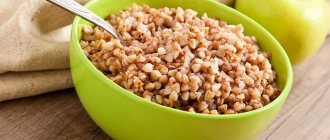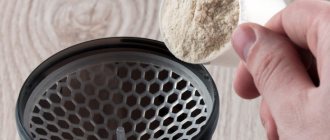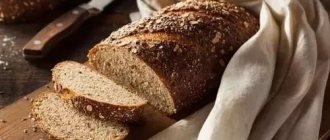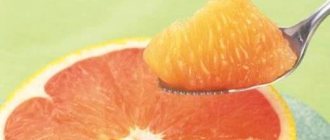For many decades, any meal was accompanied by the consumption of bread. “Bread is the head of everything” and other proverbs instill respect for this food product from childhood. However, in recent years, low-carbohydrate diets have become fashionable, and it has been proven that regular consumption of flour products leads to abdominal obesity, increases the risk of developing diabetes, and strains the gastrointestinal tract. What happens if you don't eat bread? Will my health improve and will I be able to lose weight? And won't this lead to negative consequences for health and well-being? The article describes what will happen if you don’t eat bread for at least a few weeks.
Bakery products are a source of carbohydrates for the body
Wheat, rye, whole grain flour - rarely have any of us thought about the share of products made from it in the daily diet. Meanwhile, if you do not monitor your dietary intake, you can easily exceed the proportion of carbohydrates consumed. Bakery products are primarily carbohydrates, a few grams of vegetable protein and very little fat. This is the balance of BJU in bread, regardless of what flour it is made from.
And those with a sweet tooth who prefer buns, cookies and other products made from butter or lean dough with sugar, in addition to a large amount of complex carbohydrates, also receive a huge amount of simple ones. Bakery products can contain both simple carbohydrates (which directly affect weight gain and blood sugar levels) and complex carbohydrates (which serve as a source of energy for the human body).
How to give up sweets and starchy foods forever? Advice from psychologists and nutritionists
Giving up sweets and starchy foods is not an easy task, but it is quite doable. Scientists have proven that sugar, like a drug, is addictive. Once in our body, it provokes the release of happiness hormones: serotonin, dopamine and endorphins. The mechanism of addiction is triggered specifically by them. Just realizing this fact can help you give up sweets.
How to give up sweets correctly?
- Prepare the soil. Gradually reduce your intake of sweets over two weeks. Instead of two spoons of sugar, put one in your coffee. Instead of one candy, eat only half. Replace milk chocolate with dark chocolate.
- There is nothing scarier than the word “forever.” When you decide to give up sugar, set a time frame for yourself. Most often it is 21 days or a full month. This is enough to form a habit and cleanse the body.
- Stop buying sweets and starchy foods. Give all supplies away to friends or colleagues. There should be no temptations in the house.
- Make sure your diet is as varied and balanced as possible. We often crave sweets when we are undernourished or lacking in nutrients. Be sure to eat whole grain cereals and plenty of vegetables.
- Do not combine giving up sweets with dieting. This will only increase the stress you experience.
- Make time for sports. Physical activity promotes the production of those same happiness hormones.
Do you need to completely give up sweets?
A sweet bun or a piece of cake and, for example, dates contain sugars of different origins. When we talk about giving up sweets, we mean refined sugar. The ban includes purchased sweets, cookies, pastries, cakes - products in the preparation of which granulated sugar is used. They provide no benefit other than a few seconds of pleasure. These are empty carbohydrates that cause sudden spikes in blood glucose and fat deposits. They are not able to satisfy hunger, but on the contrary, they only increase appetite.
How to stop eating sweets and starchy foods forever?
Make a choice in favor of the right carbohydrates. They are not only tasty, but also very healthy. The foods we consume should contain vitamins and essential microelements, not empty calories. Here's what you can replace refined sugar with:
1. Fruits and berries
Bananas are perhaps the sweetest - a source of potassium, magnesium and B vitamins. Very good for the heart and nervous system. Grapes contain a lot of ascorbic acid and vitamin K. It lowers blood sugar levels, improves memory and strengthens the immune system. Figs have more iron than apples. The fruit helps with mental and physical fatigue.
2. Dried fruits
Here, of course, dates will come first. They are rich in riboflavin and niacin. They are good for brain function, immunity, women's and men's health. Dried apricots and raisins are first aid for the cardiovascular system due to their high potassium content. They are also recommended for digestive problems.
3. Honey
Source of iron and calcium. It has anti-inflammatory and antibacterial properties. May cause an allergic reaction.
It is also worth paying attention to healthy sweets. These include marmalade, marshmallows and marshmallows. They contain a lot of pectin, which improves intestinal motility and cleanses the body. Make sure that the treats are prepared without added sugar and have a natural composition.
How not to indulge in sweets?
Cravings for sweets can be due to psychological or physiological reasons. First, let's deal with psychology.
We are used to seeing sweets as a reward. As children, we were given candy for reciting a poem. The cake was a mandatory decoration for the holiday table. It is this attitude that hinders us in adult life. Train yourself to perceive sugar as an enemy of health. On the contrary, use a trip to the gym as a reward.
Eat mindfully. While eating, turn off the TV and put away your smartphone. Chew foods thoroughly to differentiate their taste. This will bring much more pleasure and no additional doping will be required.
Divide sweets into small pieces. Our brain perceives quantity. To him, one banana is just one banana. Cut it into slices and the fruit will turn into a mountain of sweets.
Come up with a ritual. Every time you want something sweet, read five pages of a board book. Perhaps it will captivate you so much that you will forget about everything else.
How to stop eating a lot of sweets?
A constant desire for sweets can be caused by physiological disorders. Once you decide to minimize your sugar intake, make it a rule to get enough sleep. The body will try to make up for the lack of energy in the simplest way - sugar.
Check your hormonal levels. Rule out insulin resistance and thyroid dysfunction. Talk to your doctor about taking supplemental B vitamins and chromium. The first will support the nervous system, and the second will support blood glucose levels.
Take a caffeine detox. It provokes an increase in blood sugar levels, due to which the craving for sweets increases. Apple cider vinegar and lemon juice will help reduce glucose; include them in your diet.
What happens if you completely give up sweets?
External signs appear first. The skin becomes cleaner, the complexion is evened out. Acne and inflammation go away. Giving up sugar starts the fat burning process, and as a result, your figure becomes slimmer. The numbers on the scales begin to rapidly decrease.
Changes inside the body also occur. Intestinal function gradually normalizes. Sugar provoked fermentation processes in it and destroyed friendly bacteria. Now the intestinal biota will be restored. The digestive system will begin to work like a clock, and the immune system will become stronger.
Avoiding sweets is also a healthy heart. In response to sugar, the body releases insulin into the blood. Blood pressure increased, the heart beat faster and wore out faster. Now it can rest a little and recover.
Chronic fatigue and insomnia will also disappear from your life along with sugar. It caused the production of cortisol. The stress hormone did not allow me to fall asleep on time and took all my strength.
Is it possible to completely give up sweets? Can. Is it necessary to do this? It's up to you to decide. It is within your power to at least try and reduce your sugar intake. Drink more water, it is never too much for the body. Cook at home more often. This way you will be confident in the ingredients and their proportions, spend time with loved ones and strengthen your relationships. Use sweeteners wisely. Add them only to those dishes where you can’t do without a sweetener. For example, in baked goods or jams. Believe in yourself and take care of your health.
What happens if you give up carbohydrates
Carbohydrates provide the body with the energy it needs for mental and physical activity. Accordingly, when eating bread, a person receives a portion of energy. Since carbohydrates are simple, it requires immediate release, otherwise fat deposits will begin to accumulate.
If you give up carbohydrates completely, then in the first days the body will experience a state of shock. A person is almost guaranteed to experience the following “pleasant” sensations:
- weakness (asthenia);
- decreased performance;
- very strong appetite - after eating protein food it does not subside, since the body understands that it has not been given something, as a result of which there is no satiety;
- constipation - on a low-carb diet, you should definitely take extra fiber so that digestion does not stop;
- drowsiness;
- bad mood, irritability - this is how the body lets you know through the nervous system that it doesn’t have enough carbohydrates.
How to cook sprouted wheat
Wash and place the grains on a damp cotton or linen cloth, cover with the same damp piece of cloth on top. It is important that the fabrics are constantly wet, but they should not be flooded; the wheat should not lie in water. Soon sprouts will appear, and when their growth reaches 1-2 mm, they are suitable for consumption. Do not leave them to sprout more, because in this case you will not get any benefit from the sprouts, only harm.
It is best to consume sprouts on an empty stomach, for breakfast. For a sick and weak person, approximately 50 grams every day. It is recommended for the elderly and children over 5 years old.
The relationship between the development of diabetes mellitus and carbohydrate intake
Even if you don't eat bread, you can still develop type 1 or type 2 diabetes. This is primarily due to poor heredity. The second factor that influences the possibility of developing the disease is an increase in the consumption of sugar and other simple carbohydrates,
What happens if you don't eat bread if you have diabetes? This disease involves a forced refusal of simple carbohydrates and strictly limited consumption of complex ones. Therefore, people with diabetes are forced to refuse to eat bread, and only occasionally can they afford to eat a slice of Borodinsky. Otherwise, blood sugar levels immediately creep up.
Types of bread and effects on health and the body
Not all bread makes you fat. If you don’t have diabetes, then you can safely eat Borodino bread for breakfast. This is the healthiest option: unlike white and whole grain bread, it does not lead to obesity.
Bread with the addition of wheat bran is good - if it is made from white flour, then the calorie content will be high. But bran will help normalize digestion.
If you have the opportunity to regularly purchase bread made from oatmeal or buckwheat flour, that’s very good. These varieties contain a minimum of carbohydrates and can be eaten for breakfast. Eating bread made from buckwheat and oat flour will give you energy for the whole day, but will not contribute to excess weight gain.
What happens if you stop eating bread? Not temporarily, but on a permanent basis? It turns out that nothing bad will happen - on the contrary, when the body adapts to the new diet, health will improve and excess weight will go away. These are just two points out of seven. Yes, there are five more reasons to give up bread. To find out more, read the next section. It may change your life forever.
Seven reasons not to eat bread for an adult
From the list below, only two or three points may seem important to someone. But this is quite enough to change your diet:
- Avoiding bread in your diet will help lower your blood sugar. This will serve as an excellent prevention of the development of type 2 diabetes.
- White flour contains gluten. Recent studies have proven that this substance can lead to flatulence and the development of chronic diseases.
- Any person, even with a hereditary tendency to be overweight, will lose weight by giving up baked goods (since they are very high in calories).
- Modern bread contains yeast, preservatives, flavorings and other chemicals in smaller or larger quantities.
- Bread contains a minimum of vitamins and microelements - there are products with much higher nutritional value.
- Enzymes (often genetically modified) are added to flour and dough to make loaves of bread larger and remain soft for days or even weeks.
- Regular consumption of bread leads to a deterioration in intestinal function in some people, in particular a decrease in peristalsis.
Thermophilic yeast
This yeast has another name - Saccharomycetes. They are used in bakery products, brewing and the alcohol industry. They don't exist in nature. This yeast is stronger than our cells. They live both during cooking and after they enter the human mouth. Yeast cells, once in the body, begin to secrete toxic substances, affecting our cells.
© hermaion/Pexels
A toxic protein from yeast cells has a detrimental effect on the membranes of human cells, opening them to harmful viruses and microbes. Initially, yeast cells end up in our digestive tract, and from there they travel through the blood throughout the body.
In the human body, thermophilic yeast begins to multiply very quickly, thus harmful microflora actively exists, preventing the development of good microflora, with the help of which, with the right lifestyle, B vitamins and other important microelements are produced in our intestines.
Thermophilic yeast disrupts the functioning of all digestive organs. Inside, our stomach has a special mucous membrane that resists the action of acid. But when a person eats too much yeast and acid-producing foods, the stomach will not be able to tolerate it for very long. The result will be a burn, which will lead to the appearance of ulcers and to such a well-known condition as heartburn.
Eating products made from thermophilic yeast leads to the accumulation of sand in the body, which subsequently becomes stones in the liver, pancreas, and gall bladder, as well as to the appearance of constant constipation and the development of tumors.
© Pixabay/Pexels
In the intestines, rotting processes gain momentum, harmful microflora increases, feces cannot leave the body in time, so-called gas pockets are formed, in which toxic fecal deposits lie. Over time, these stones grow together with the mucous and submucosal parts of the intestine. The secretion secreted by the digestive organs can no longer fulfill its protective function, which is why the digestive function also decreases. Vitamins and microelements are very difficult to absorb and are difficult to produce.
What will happen to the body if you give up bread only occasionally?
To begin with, you can give up baked goods only partially. Completely eliminate buns and cookies, and eat bread only in the morning and at lunch. As a rule, this change in diet alone is enough to reduce weight and improve your well-being.
What happens if you don't eat bread for a week? This time for radical changes is quite short. To notice more or less pronounced changes in your well-being, you should not eat baked goods for at least two months. During this time, metabolism will have time to readjust. Under no circumstances should you go hungry or undernourish: protein products, as well as cereals high in complex carbohydrates, should take the place of bread. If you switch to a completely carbohydrate-free diet, this can be a blow to the body and subsequently lead to even more weight gain. At least in the morning you should consume a minimum amount of simple carbohydrates.
Ways to give up bread
- Be sure to have breakfast, preferably porridge. This will saturate the body until lunch and there will be no cravings for a snack.
- Consume carbohydrates throughout the day. Eat whole grain baked goods, vegetables and fruits. Carbohydrates are energy, so you need to consume them in the amount of 50-60% of your daily diet.
- Bread is a sweet pastry. Limit portions gradually - first to one bun per day, then to one per week. Eat dark chocolate, dried fruits and fresh berries as an alternative to sweets.
- Motivation. If you are overweight, cutting out empty calories will help you lose it.
- Having goodies at home. When they are at hand, you are tempted to eat something sweet, especially when you have nothing to do. Do not buy these products and warn your loved ones about it.
How much weight can you lose if you exclude baked goods from your diet?
This question interests mainly girls. It is difficult to give an exact answer to this - the numbers depend on individual parameters.
If you give up baked goods completely, then on average weight loss occurs by 1-3 kg per week. The more excess weight, the faster it will go away in the first weeks. If there are only a few extra kilos, then the weight can be only half a kilo per week.
For breakfast, it is permissible to eat a couple of pieces of Borodino bread. If a person’s goal is only to lose weight, then taking this food product will not affect the intensity of getting rid of excess fat.
How to survive carbohydrate withdrawal without unnecessary stress
What happens if you don't eat bread at all? At first, the body will persistently demand the amount of calories and the ratio of nutrients to which it is accustomed. To minimize the consequences of giving up bread, you can try to implement the following tips:
- eat more fruits rich in fiber and fructose;
- in no case limit, and if possible even increase the share of protein in the diet;
- find yourself a hobby that would help distract you from the desire to eat fast carbohydrates;
- drink as much clean water as possible - this trick will help create a feeling of satiety;
- introduce fermented milk products into your diet on a regular basis.
What are the benefits of bread?
Let's first figure out what beneficial substances are contained in bread. It is rich in riboflavin, niacin, thiamine, biotin and other B vitamins, and many of these elements are much better absorbed from bread than from other foods. B vitamins regulate the functions of the nervous system, and if they do not enter the body, this is fraught with the development of depression and neurological ailments. If you are hot-tempered, whiny, irritable, and get tired quickly, this indicates a deficiency of vitamins of this group. Next, bread contains vitamin E, which is involved in DNA synthesis and stabilization of red blood cells and muscle tissue. In addition, vitamin E is a powerful antioxidant that prevents the aging of body tissues. Useful minerals are also present in bread in significant quantities - magnesium, potassium, phosphorus, sodium, vanadium, manganese, cobalt. Vanadium is generally difficult to find in nature, and yet it is involved in many reactions of the body, for example, in metabolic processes. Opponents of bread who want to lose weight are mainly afraid of the content of complex carbohydrates in it. But with a lack of carbohydrates, the synthesis of serotonin, the neurotransmitter hormone, thanks to which we successfully resist stress, is disrupted. Bread made from wholemeal flour, bran and whole grains contains large amounts of dietary fiber. They help normalize intestinal function, as well as remove waste and toxins from the body and reduce cholesterol levels in the blood.
Medical advice: who is a low-carb diet contraindicated?
A complete abstinence from carbohydrates is not always a good thing. To eat bread or not - everyone must decide for themselves. At a minimum, you should leave porridge, vegetables, and fruits in your diet. With a complete refusal of carbohydrates, the urinary system suffers - the kidneys simply do not have time to remove protein breakdown products, which can deteriorate the functionality of this paired organ.
With a low-carb diet, you can completely eliminate bread, but you must consume carbohydrates in moderation with other foods. This diet is contraindicated for people with chronic kidney disease, impaired liver function, and impaired metabolism.











